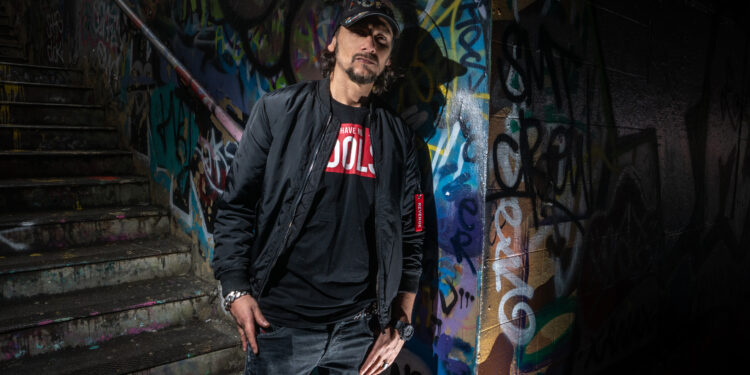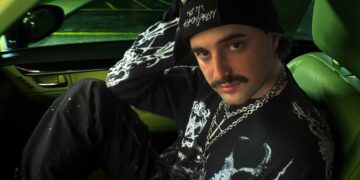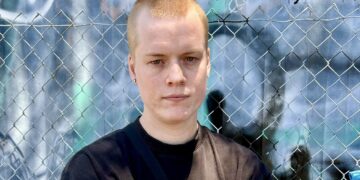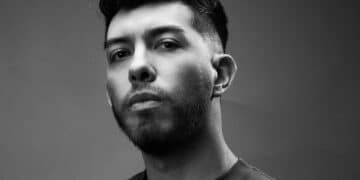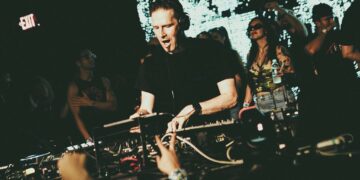We spoke with Bassboy about the genres that have shaped his sound, the resurgence of garage and bassline, and Black artistry in the UK dance music scene.
When talking about bassline and UK garage, Birmingham DJ and producer Bassboy is bound to merit a mention given his influence within these genres since 2009. But now, it appears as if the mainstream media is catching on. His 2020 breakout tune, “Thru Your Mind” featuring vocalist Salo, clocked millions of streams, even landing in a campaign by UK-based fast-fashion retailer PrettyLittleThing.
Bassboy’s story runs deeper than viral numbers and campaigns, though. He’s been producing music since 2007, tracing his roots back to rap in his early school days when he would participate in talent shows, sharing his musical skills with classmates. Now, the UK-based artist has worked alongside noteworthy acts like Frisco, Trilla, and Scrufizzer, and he has landed releases on popular record labels such as AC Slater’s Night Bass, CruCast, and ReBearth Records.
Discovered during the 2000s through Microsoft’s MSN messaging application, Bassboy began producing tracks and sharing them via public chat rooms. After promoters continuously reached out, the artist realized he had to take DJing to the next level. Drawing from his musical inspirations — like TRC, Subzero, and DJ Pied Piper — as well as moments of silence during long walks, the artist now reflects on what it means to be a musician and how to stay outside of a box.
We spoke with Bassboy about the genres that have shaped his sound over the years, the resurgence of garage and bassline on a global scale, and how the deep cultural roots of Black artistry are often overlooked in dance music.
Stream Bassboy’s most recent release, “2AM” featuring Klaudia Keziah on Spotify below, and keep reading for our in-depth interview with him.
You’ve played a pivotal role in bassline and UK garage for the past decade, but as someone who began with rap music, when did you know you wanted to pursue your career as a DJ in these styles?
I still rap! I’m actually working on a rap album now, and I’ve gotten to that point in my career where I don’t really consider myself just a bassline DJ. I just look at myself as a musician overall.
I’ve been doing bassline since 2007, but it’s resurging! I got into it during the times when MSN the messaging app was popular. And, like, there was a thing in England, where people used to send music tracks around public chats in MSN. It was called “leaking,” and I was producing and sending out a lot. I think I stayed in my house for like two years because I got obsessed with the idea of staying in my house, making bassline, and sending them out through MSN. I didn’t DJ or anything at the time. And then, promoters started contacting me to say, “We want to book you.” I found that I was popular through that.
Then, I had to learn how to DJ in like, two weeks — really quickly! I was terrible for my first set. It was really bad, but when I went up to DJ, I realized everyone knew the songs. That was the first moment when I realized, “Oh, this is something I should be doing.”
Through your Instagram feed, it’s obvious that daily walks are important to you. Apart from a good bassline, what gets your creative juices flowing? Do you draw inspiration from other genres or walks in nature?
Recently, I’ve been doing crazy walks. Like, I’ve gone up to 24,000 steps. I’ve stopped listening to music on the walks now, and I’m getting more inspiration from these natural sounds.
I don’t actually listen to any of the music that I make. I listen to lo-fi hip hop and old R&B. I get my inspiration from that. I don’t listen to electronic music when I’m actually listening to music. But yeah, it’s the sounds of nature. I guess it changes over time, but right now, it is definitely them walks. Those crazy birds on the canal, you know? The more I lower my sensory input, the more inspiration I’m getting. I feel like I’ve gotten so much more dopamine from it. It’s actually essential for me right now.
Bassline has seen a major resurgence recently, both in the UK and globally. How do you feel about its evolution, and what do you think is driving this renewed interest?
When I started, it was a lot similar to how it is now. I think there’s a new generation of listeners because a lot of the stuff that is being played is like, 10, 15, 20 years old, and they are hearing it for the first time, thinking, “Wow, that sounds amazing.”
It also made me remember what it was like when I first heard it, and how insane it was to hear that style of music for the first time. Obviously, a few years back, in 2017, the last version of bassline was a bit more slowed down. Now, it’s like 140 BPM, which is what the original tempo was. But a few years ago, it was 128 to 130, when I was working with AC Slater. It was a lot slower, closer to a house tempo, but it was aggressive.
I think it’s that sound and the new crowd that is definitely pushing it right now, because they are just hyper!
You’ve collaborated with other influential Black voices in the scene, like Frisco and Trilla. How important is it for you to collaborate with the community and create space for the next generation of Black talent?
It’s very important! I used to collaborate years ago, but it wasn’t, like, planned collaboration. It was more like, “Oh, we’re all in the same thing? Let’s do a tune.” But now I’m structuring it, especially with Black artists. I do think Black artists really need to focus on working with each other, so I’m just trying to basically do what I can with my platform and power.
To be honest, in the earlier years, all of the artists were Black — like, mostly Black. There was TRC, Subzero, DJ Pied Piper, and the master of ceremonies, Burgaboy. I came into bassline listening to these people. They literally created the scene, like they created that sound. Before I started making bassline, I was going to bassline events with my friends as ravers. And I remember hearing some of these artists whom I’ve now been on stage with.
With tracks like “Thru Your Mind” and now “Luv Letters” making waves, your music blends underground energy with mass appeal. How do you balance pushing boundaries with staying true to the core community and culture that raised you?
When I made “Thru Your Mind,” it was COVID, and I was pissed off because they canceled my Australian tour. I remember driving, and I literally just saw that the sun was looking a certain way. And I was like, “Oh, I want to make a song that represents what I’m seeing right now,” so I went back and I made that track, but I remember ranting to myself, when I was making it, about these effing promoters. [Laughs] I didn’t actually expect that track to do as well as it did. It was insane. Funny when that happens.
And with “Luv Letters,” that track is another instrumental that I made a long time ago, but then I met Klaudia Keziah, and she’s just an amazing artist. She is a genius. She came up with those lyrics in probably 10 minutes and sent me the vocals back. I was like, “This is amazing.”
Any words of influence for any other independent producers and DJs in the UK dance music scene?
Yeah, definitely, just do it for the passion. I keep telling people this. I’ve gone through levels where I’m getting paid $4k for a show, to having to pay a lot of taxes, or trying to buy a house, and getting all my money taken.
If you follow it for the money, I’m telling you, you’re gonna have problems. If you got into music for the passion, just do it for that, because that will drive you through breakups, through makeups, through the good times and the bad, and it will always keep you going. Make music, enjoy making music, and do it for yourself and from the heart. That’s the most I can tell people, after everything I’ve learned in this industry.



